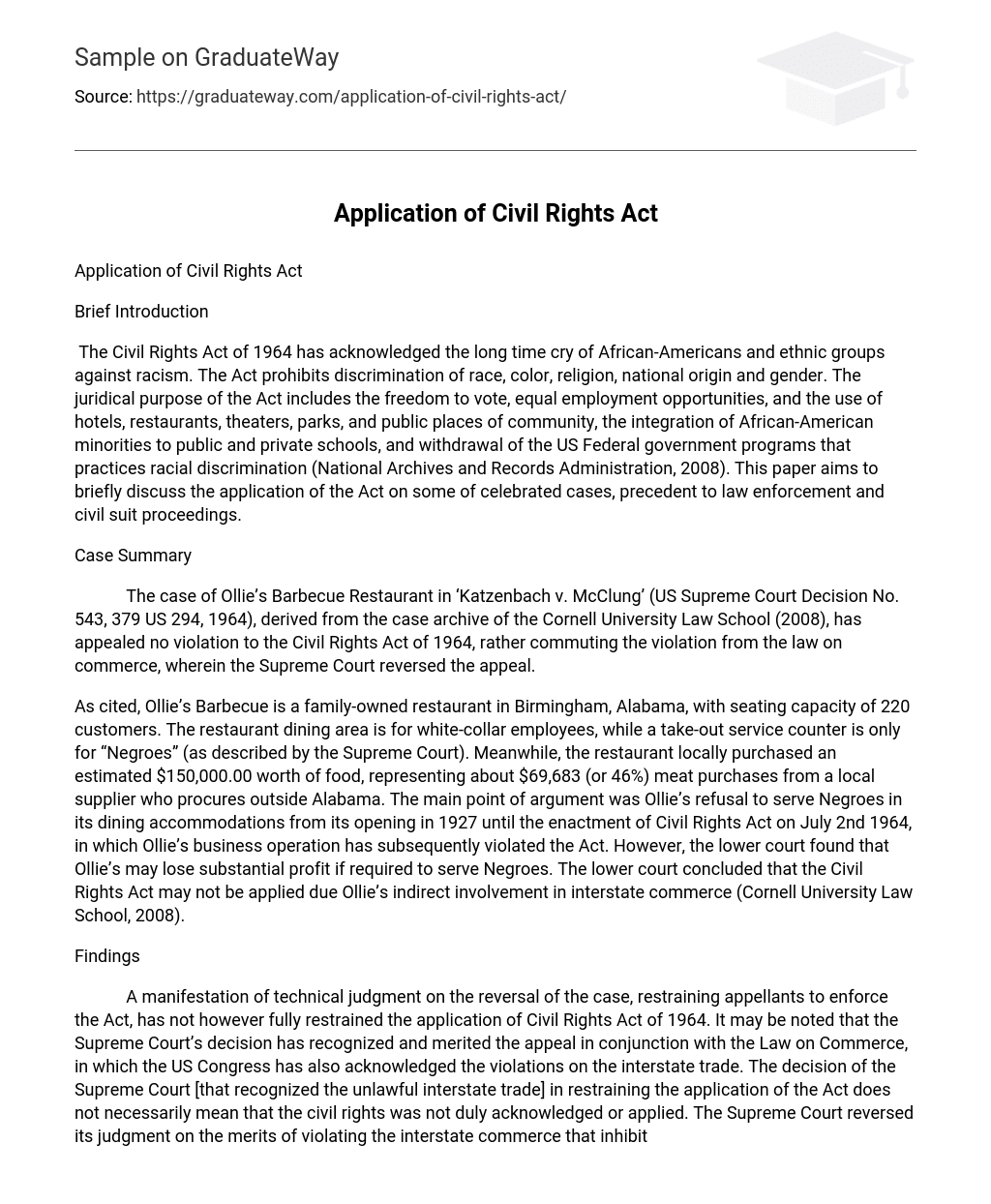Brief Introduction
The Civil Rights Act of 1964 has acknowledged the long time cry of African-Americans and ethnic groups against racism. The Act prohibits discrimination of race, color, religion, national origin and gender. The juridical purpose of the Act includes the freedom to vote, equal employment opportunities, and the use of hotels, restaurants, theaters, parks, and public places of community, the integration of African-American minorities to public and private schools, and withdrawal of the US Federal government programs that practices racial discrimination (National Archives and Records Administration, 2008). This paper aims to briefly discuss the application of the Act on some of celebrated cases, precedent to law enforcement and civil suit proceedings.
Case Summary
The case of Ollie’s Barbecue Restaurant in ‘Katzenbach v. McClung’ (US Supreme Court Decision No. 543, 379 US 294, 1964), derived from the case archive of the Cornell University Law School (2008), has appealed no violation to the Civil Rights Act of 1964, rather commuting the violation from the law on commerce, wherein the Supreme Court reversed the appeal.
As cited, Ollie’s Barbecue is a family-owned restaurant in Birmingham, Alabama, with seating capacity of 220 customers. The restaurant dining area is for white-collar employees, while a take-out service counter is only for “Negroes” (as described by the Supreme Court). Meanwhile, the restaurant locally purchased an estimated $150,000.00 worth of food, representing about $69,683 (or 46%) meat purchases from a local supplier who procures outside Alabama. The main point of argument was Ollie’s refusal to serve Negroes in its dining accommodations from its opening in 1927 until the enactment of Civil Rights Act on July 2nd 1964, in which Ollie’s business operation has subsequently violated the Act. However, the lower court found that Ollie’s may lose substantial profit if required to serve Negroes. The lower court concluded that the Civil Rights Act may not be applied due Ollie’s indirect involvement in interstate commerce (Cornell University Law School, 2008).
Findings
A manifestation of technical judgment on the reversal of the case, restraining appellants to enforce the Act, has not however fully restrained the application of Civil Rights Act of 1964. It may be noted that the Supreme Court’s decision has recognized and merited the appeal in conjunction with the Law on Commerce, in which the US Congress has also acknowledged the violations on the interstate trade. The decision of the Supreme Court [that recognized the unlawful interstate trade] in restraining the application of the Act does not necessarily mean that the civil rights was not duly acknowledged or applied. The Supreme Court reversed its judgment on the merits of violating the interstate commerce that inhibited the “Negroes” from travelling. The Supreme Court’s merit on “violation to interstate commerce” recognizes the fact that civil rights of “Negroes” be upheld (US Supreme Court Decision No. 543, 379 US 294, 1964).
Conclusion
Even though the Civil Rights Act has not totally resolve the entire problems on racial discrimination, the enactment of the Act has opened the assimilation of cultures, recognized multiculturalism and strengthened the cultural ties in preserving national democracy through participation of African-American and ethnic minorities in electoral processes.
In conclusion, the application of the Civil Rights Act of 1964 is perceived to have three significant contribution in the US’ interstate policies and governance, such as (1) to sustain the constitutional power of the state, (2) promote guidance to the legislative capability of Congress, and (3) affirm the judicial function and performance of the judiciary in upholding the due process of law and equality of justice. Thus, the Civil Rights Act of 1964 has empowered the citizens and races within the state to pursue the civic duties and constitutional rights.
References
Cornell University Law School (2008). ‘Katzenbach v. McClung’. US Supreme Court Decision
No. 543, 379 US 294, 1964. Retrieved 14 September 2008 from
http://www.law.cornell.edu/supct/html/historics/USSC_CR_0379_0294_ZO.html.
National Archives and Records Administration (2008). ‘Congress and the Civil Rights Act of
1964’. Retrieved 14 September 2008 from
http://www.archives.gov/exhibits/treasures_of_congress/page_24.html#.





